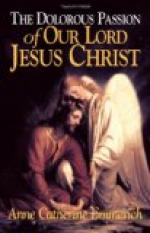no more of the fruit of the vine,
etc., come
after the consecration, but in St. Luke, they come
before. On the contrary, all that concerns the
traitor Judas comes here, as in St. Matthew and St.
Mark, before the consecration; whereas in St. Luke,
it does not come till afterwards. St. John, who
does not relate the history of the institution of
the Holy Eucharist, gives us to understand that Judas
went out immediately after Jesus had given him the
bread; but it appears most probable, from the accounts
of the other Evangelists, that Judas received the
Holy Communion under both forms, and several of the
fathers—St. Augustine, St. Gregory the Great,
and St. Leo the Great—as well as the tradition
of the Catholic Church, tell us expressly that such
was the case. Besides, were the order in which
St. John presents events taken literally, he would
contradict, not only St. Matthew and St. Mark, but
himself, for it must follow, from verse 10, chap.
13, that Judas also had his feet washed. Now,
the washing of the feet took place after the eating
of the Paschal lamb, and it was necessarily whilst
it was being eaten that Jesus presented the bread to
the traitor. It is plain that the Evangelists
here, as in several other parts of their writings,
gave their attention to the sacred narrative as a
whole, and did not consider themselves bound to relate
every detail in precisely the same order, which fully
explains the apparent contradictions of each other,
which are to be found in their Gospels. The following
pages will appear to the attentive reader rather a
simple and natural concordance of the Gospels than
a history differing in any point of the slightest
importance from that of Scripture.
MEDITATION I.
Preparations for the Pasch
Holy Thursday, the 13th Nisan (29th of March).
Yesterday evening it was that the last great public
repast of our Lord and his friends took place in the
house of Simon the Leper, at Bethania, and Mary Magdalen
for the last time anointed the feet of Jesus with
precious ointment. Judas was scandalised upon
this occasion, and hastened forthwith to Jerusalem
again to conspire with the high-priests for the betrayal
of Jesus into their hands. After the repast,
Jesus returned to the house of Lazarus, and some of
the Apostles went to the inn situated beyond Bethania.
During the night Nicodemus again came to Lazarus’
house, had a long conversation with our Lord, and
returned before daylight to Jerusalem, being accompanied
part of the way by Lazarus.
The disciples had already asked Jesus where he would
eat the Pasch. To-day, before dawn, our Lord
sent for Peter, James, and John, spoke to them at
some length concerning all they had to prepare and
order at Jerusalem, and told them that when ascending
Mount Sion, they would meet the man carrying a pitcher
of water. They were already well acquainted with
this man, for at the last Pasch, at Bethania, it had
been he who prepared the meal for Jesus, and this is
why St. Matthew says: a certain man. They
were to follow him home, and say to him: the
Master saith, My time is near at hand, with thee I
make the Pasch with my disciples (Matt. 26:18).
They were than to be shown the supper-room, and make
all necessary preparations.




